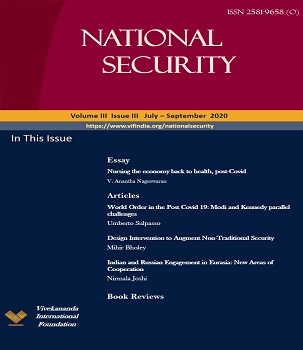About the Issue
In the context of the overwhelming impact of the Corona pandemic, it has becoming evident that the international system cannot be run any more in the existing manner. The strategy of total globalisation and continuous material growth without considering in value terms their impact on the environment, health, urban habitation and the welfare of labour has become unsustainable. States need new principles to create strong internal capacities to prevent such extreme health crisis and global supply chains need to be diversified. The world simultaneously faces a major geopolitical crisis as a result of the rise of an authoritarian, jingoistic and expansionist China determined to dominate Asia and the international system. This deadly confluence of the two threats – both originating in China --is a reminder of the 1919-39 period when a similar pandemic had killed millions, weakened democracies, contributed to the onset of economic depression and given rise to a nationalist and expansionist Germany, and a devastating global war. A new global partnership, especially of leading democracies, has become essential.
The current issue of National Security carries three contributions that examine the impact of the Covid-19 pandemic on the Indian economy, human security and national strategy. Anantha Nageshwaran argues that the costs of the pandemic in India have been extremely high and the country needs to rapidly return to economic rebuilding and wider structural reforms. Umberto Sulpasso in a path-breaking contribution emphasises that a new world order is emerging. He calls for a new Gross National Knowledge Product centred economic model for India that incorporates the digital economy, IT and internet revolution, and the immense value of non-material factors such as environment, health, education. The new model is also essential to deal with the China threat. Mihir Bholey in his innovative article underlines the importance of non-traditional security and the need to introduce design thinking to solve complex problems.
The issue also covers important contributions on new trends in India-Russia collaboration in Eurasia, the Libyan crisis and the extensive use of the internet and the media by terrorist groups such as the Islamic State. These are all valuable and highly relevant contributions.
Letters and Comments
Readers can share their views on National Security by e-mail to: the Editor, National Security. E-mail: [email protected]
For more information go through submission guidelines
Editor's Note
Editorial Board
International Editorial Advisory Board
Contents : Vol. III Issue III | July-September 2020
Essay
Nursing the economy back to health, post-Covid | V. Anantha Nageswaran
Articles
World Order in the Post Covid 19: Modi and Kennedy parallel challenges | Umberto Sulpasso
Design Intervention to Augment Non-Traditional Security | Mihir Bholey
Indian and Russian Engagement in Eurasia: New Areas of Cooperation | Nirmala Joshi
How Turkey uses Libya to achieve its foreign policy objectives | Dr Yatharth Kachiar
Wilayat-e-Internet: Islamic State Cyber Caliphate | Anurag Sharma
Book Reviews
China and the South China Sea Imbroglio | Teshu Singh
Important Information
- The copyright of National Security rests with VIF.
- Submissions to National Security should be original and not published elsewhere or submitted for publication elsewhere. The Publication reserves the first right of refusal.
- The submissions will be peer-reviewed/refereed as well as undergo a plagiarism check.
- The Editor/Institute reserves the right to make a final decision on the publication, National Security post-review as well as the right to make alterations.
Selected contributors will be informed of the decision to include their articles in the forthcoming Publication via email. - If the author seeks to use an article published in National Security as part of another work, then you will need to get the requisite permission from the Publication, National Security.
All Rights Reserved.
No part of this publication may be reproduced, stored in a retrieval system, or transmitted in any form, or by any means- electronic, mechanical, photocopying, recording or otherwise- without the prior permission of VIF.


Post new comment